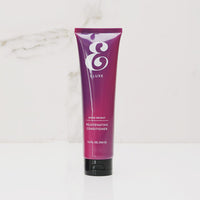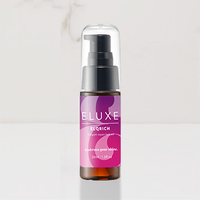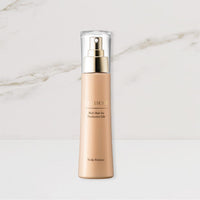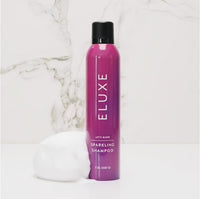Does Dry Shampoo Damage Hair?
In some ways, the invention of dry shampoo has been a styling miracle for women. No time to wash your hair before running out the door? Dry shampoo. Greasy, flat roots? Dry shampoo. No one can deny the product is a lifesaver in a pinch.
However, there is a lot of debate as to whether dry shampoo damages your hair. For one thing, it isn’t even shampoo (we’ll get into that later). It also has the potential to clog up your pores.
The short answer is that dry shampoo should be fine if used occasionally, but long-term use can be really bad for your hair and scalp.
How Dry Shampoo Works
Like we mentioned earlier, dry shampoo is not shampoo. Shampoo contains surfactants that strip the grease and dead skin cells from your scalp when you lather and rinse with water. In short, shampoo cleanses.
Dry shampoo does not clean your hair at all—it doesn’t remove any of the oil or dirt from your hair. Instead, dry shampoo contains alcohol and starch meant to absorb the grease in your hair to make it less noticeable.
A starchy or powdery film is usually left behind on your hair and scalp when you use dry shampoo. This residue is what makes dry shampoo bad for your hair and scalp when used for a long period.
Effects of Dry Shampoo on the Scalp
Because it does not clean your scalp, all the oil, dirt, and dead skin you hide under a coat of dry shampoo gets stuck there. The scalp can get clogged by all of the stuff sitting on your skin.
If you wash your hair regularly (around 2-3 times per week is sufficient for most women) and only use dry shampoo here and there, it doesn’t pose much of a threat to your hair health because the dry shampoo starch and sebum (natural oil produced by your scalp) won’t have a chance to accumulate on your skin.
On the other hand, if you are using dry shampoo daily and not washing your hair with shampoo and water often enough, the residue on your scalp will build up, which can cause:
- Clogged hair follicles (which can lead to hair loss and fallout)
- Itching and flaking on the scalp
- Dandruff
- Bacterial infections
Effects of Dry Shampoo on Hair
Although it depends on the dry shampoo you buy, many are in aerosol form and contain alcohol. These types of dry shampoo are bad for your hair because the alcohols dry out and weaken your hair.
While using dry shampoo once or twice isn’t going to cause all of your hair to snap off, prolonged use can lead to breakage. When the hair shafts become brittle due to the alcohol, they are more likely to snap and break, especially when you brush your hair.
There is a rumor that dry shampoo stunts hair growth. This isn’t exactly true. The product is relatively safe to use occasionally. Stunted hair growth is more likely to be a result of overuse of dry shampoo, leading to poor scalp health (which impacts hair growth) and damaged hair follicles and shafts.
Pros and Cons of Dry Shampoo
Just so we’re clear, dry shampoo is not exactly bad. Dry shampoo does damage hair when used too frequently, but when used responsibly (and rarely), it can be a great styling tool and time saver.
Pros
- Saves you time in the morning
- Can make it easier to go days between washes
- Preserves the color of dyed hair because you don’t have to get it wet as frequently
- Adds texture to hair that can be great for styling
Cons
- Doesn’t clean your hair
- Exposes your hair and scalp to alcohol and chemicals
- Can be extremely expensive
- Frequent use can damage your scalp and hair
- Some dry shampoos contain talcum powder, which has been linked to cancer
Dry Shampoo Alternatives
If you’d rather not mess with dry shampoo but still want something to help keep your hair from getting greasy, there are a few alternatives that you can try.
Wash Your Hair More Often
It’s a bit boring, but it might not be a bad thing to go back to the basics. Rather than constantly choking your hair with dry shampoo, washing it a little more frequently may help you better combat greasy roots.
Spray with Vinegar
Washing your hair with vinegar has gotten super popular in the haircare world. So why not use it as a spray? Simply put some apple cider vinegar in a spray bottle and mist your hair where it’s greasy.
The vinegar will evaporate quickly and leave your hair and scalp feeling a bit refreshed. Vinegar is also antibacterial, so you won’t have to worry about bacteria growing on your head.
The downside is that vinegar can have a drying effect on your hair, similar to alcohol. Frequent use could make your hair dry or brittle and cause damage in the same way dry shampoo does. Vinegar also has a pretty strong smell that you might not enjoy having in your hair all day.
Cornstarch and Cocoa Powder
Hold on—we know it sounds weird, but this can be a safer (and much cheaper) alternative to store-bought dry shampoos.
Cornstarch is obviously a starch, which means it can absorb the excess oil on your head.
The unsweetened cocoa powder is more for smell (mmmm, who doesn’t want their hair to smell like chocolate?) and for color to make it blend better with dark hair. If you have blonde or light hair, you’ll definitely want to omit the cocoa.
All you have to do is mix a little cornstarch and cocoa powder in a jar or bowl, and then apply it to your hair with a makeup brush. The benefits of this alternative are that it’s easy, cheap, and doesn’t contain any talcum powder, alcohol, or aerosols.
However, it still won’t clean your hair, and it does leave a residue. So regular hair washing is still a must.
Try Eluxe for Scalp Health
Eluxe’s specially formulated shampoos are made to cleanse your scalp and promote hair growth. Eluxe’s hair care products are meant to keep your hair healthy and beautiful.
Learn more about Eluxe today.










